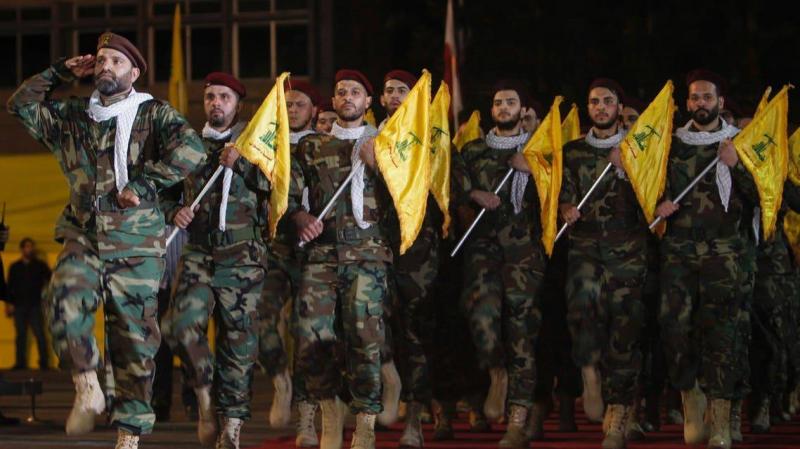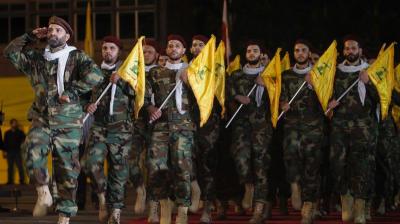Under the title "In Detail: How Hezbollah Expands Its Statelet and Extends Its Economy," the Arabic website Albaida.net published an article by writer Johnny Fakhri regarding Hezbollah's cooperatives and the purchasing card it launched. The article highlights how, as the economic crisis tightens its grip on the Lebanese people amid the continuous collapse of the lira against the dollar and the ensuing loss of salaries alongside skyrocketing prices of consumer goods, Hezbollah is bolstering its statelet at the expense of the Lebanese state by creating an independent economic situation that exclusively benefits its own community.
In light of the economic and living collapse affecting most Lebanese due to the corruption of the political class and the obliteration of savings in banks, Hezbollah has mobilized to strengthen its supportive environment under the slogan "We will not starve," previously raised by its Secretary-General Hassan Nasrallah. This is aimed at alleviating some of the discontent directed towards it as Shiite voices have begun to explicitly or indirectly blame it for the deteriorating economic and financial situation due to its protection of the corrupt system over decades.
### Cooperatives and the "Sijjad" Card
Hezbollah has opened a series of cooperatives as shopping centers for those holding "Sijjad" food cards previously distributed to the more impoverished members of its community. Social media images indicate that the shelves in these cooperatives have recently been stocked with food items like canned goods, pasta, and cleaning products.
The "Sijjad" magnetic card allows its holders to purchase goods and food items from the "Sijjad" cooperatives at prices lower than those of government-subsidized goods. The card's ceiling is set at 300,000 lira (about $30 according to the black market exchange rate, where the dollar ranges from 12,000 to 13,000 lira).
### Free Card
According to information from Albaida.net, the card is issued for free after verifying the holder's social status. If an individual earns under one million lira, they receive a 40% discount on products. If their salary exceeds 1,400,000 lira, they receive discounts of up to 20% on specific goods. The "Sijjad" scheme is funded by holders of the "Noor" card, designated for military personnel and employees of Hezbollah who receive their salaries in dollars.
Hezbollah's move has stirred a public outcry in Lebanon, raising questions about the identity of these goods and whether they are imported or subsidized by the Central Bank of Lebanon, from which citizens have suffered from "missing" subsidized goods on supermarket shelves. It has led to intense competition among people to obtain subsidized items such as oil and milk when available in stores.
### Iranian, Iraqi, and Syrian Products
Albaida.net reported that most of the goods available in "Sijjad" supermarkets are Iranian, with some being Syrian and Iraqi, primarily including essential items like tea, canned chickpeas, corn, and tuna. Subsidized products will be available after Ramadan to prevent a rush at supermarkets which may lead to issues, unlike what happened in previous days.
### Other Branches
Furthermore, Hezbollah plans to open additional branches of these cooperatives in Beirut, the South, and Bekaa. Although Lebanon has been distinguished by its free economy and open markets, many Lebanese questioned following the announcement of the "Sijjad" opening how these products entered the Lebanese market and whether they went through formal channels and paid the requisite taxes like others.
### Supermarket Statement
Notably, the head of the Supermarket Owners' Syndicate in Lebanon, Nabil Fahd, stated to Albaida.net that he had no information about "Sijjad" supermarkets, having only heard about them through the media. He confirmed that he had no knowledge of the types of goods they were selling or whether they were subsidized or imported from Iran. This statement reinforces that Hezbollah's institutions are "isolated" from official entities and solidify the logic of its distinct statelet.
### Parallel Economy
Regarding the "legitimacy" of the goods, economic journalist Mohasen Morsel explained to Albaida.net that Hezbollah's actions are a continuation of its own economic system. They likely entered either through legal or illegal crossings over which Hezbollah has control without paying customs fees, or through social institutions associated with it, such as the "Martyr Foundation," which according to Lebanese law is exempt from taxes and customs duties. She noted that social provisions are not new to Hezbollah but have drawn attention recently as the state has abandoned its citizens, leading to questioning the role of political parties amid this crisis.
### The Message of Hezbollah
In turn, Mohammed Awad, deputy editor-in-chief of the International News Network, said to Albaida.net that Hezbollah is today reinforcing the idea of the statelet in place of the state by opening its cooperatives for holders of the "Sijjad" card. He added that within these cooperatives, there are only limited food items, and it remains unclear how these items were brought in and whether they crossed Lebanese customs centers, if the Ministry of Economy is aware of their types, and whether they conform to agreements on the entry between states. Awad emphasized that, despite preventing starvation, there are no luxuries or essentials for children, such as baby formula or diapers.
### How Did They Enter?
Lawyer Majd Harb, who previously filed a complaint with the financial public prosecution against Hezbollah for tax and customs evasion and money laundering depriving the Lebanese state of hundreds of millions of dollars, asserted that there are many questions about how Hezbollah imports goods into Lebanon and whether they meet legal conditions regarding customs fees. He indicated that if it is proven that the goods found in the "Sijjad" cooperatives are funded by Lebanese taxpayers, thus through the subsidy policy, this would confirm that Hezbollah's "parasitic" economy is thriving at the expense of the national economy. He argued, "The hostile policy adopted by Hezbollah towards our Arab brothers has led us to beg for a food parcel."
### "Sijjad" Card
Sheikh Abbas Jouhari, head of the Arab Center for Dialogue and Studies, told Albaida.net that Hezbollah is trying to address the "cancer" of the economic crisis with painkillers, and its recent food initiative does not satisfy hunger. He coined the term "Sijjad card" as "the jailer's card," asserting that it imprisons Lebanese people within a food aid parcel while deepening patronage. Jouhari, known for his opposition to Hezbollah's policies, noted that the celebrations organized by Hezbollah at the opening of the "Sijjad" supermarket were an insult to the people.
He also suggested that part of the goods in the "Sijjad" supermarket is subsidized by the Central Bank of Lebanon, which Hezbollah previously stored in its private warehouses, and the subsidy mechanism approved by Hassan Diab's government is funded by the Central Bank's reserves, estimated at $6 billion.




